Watsonville City Council Districts 1, 2 and 6 are up for election. District 6 is the only contested race. View an interactive map of Watsonville City Council districts or look up which districts you live in by your address.
In District 6, incumbent Watsonville City Councilmember Jimmy Dutra faces off against Trina Coffman-Gomez.
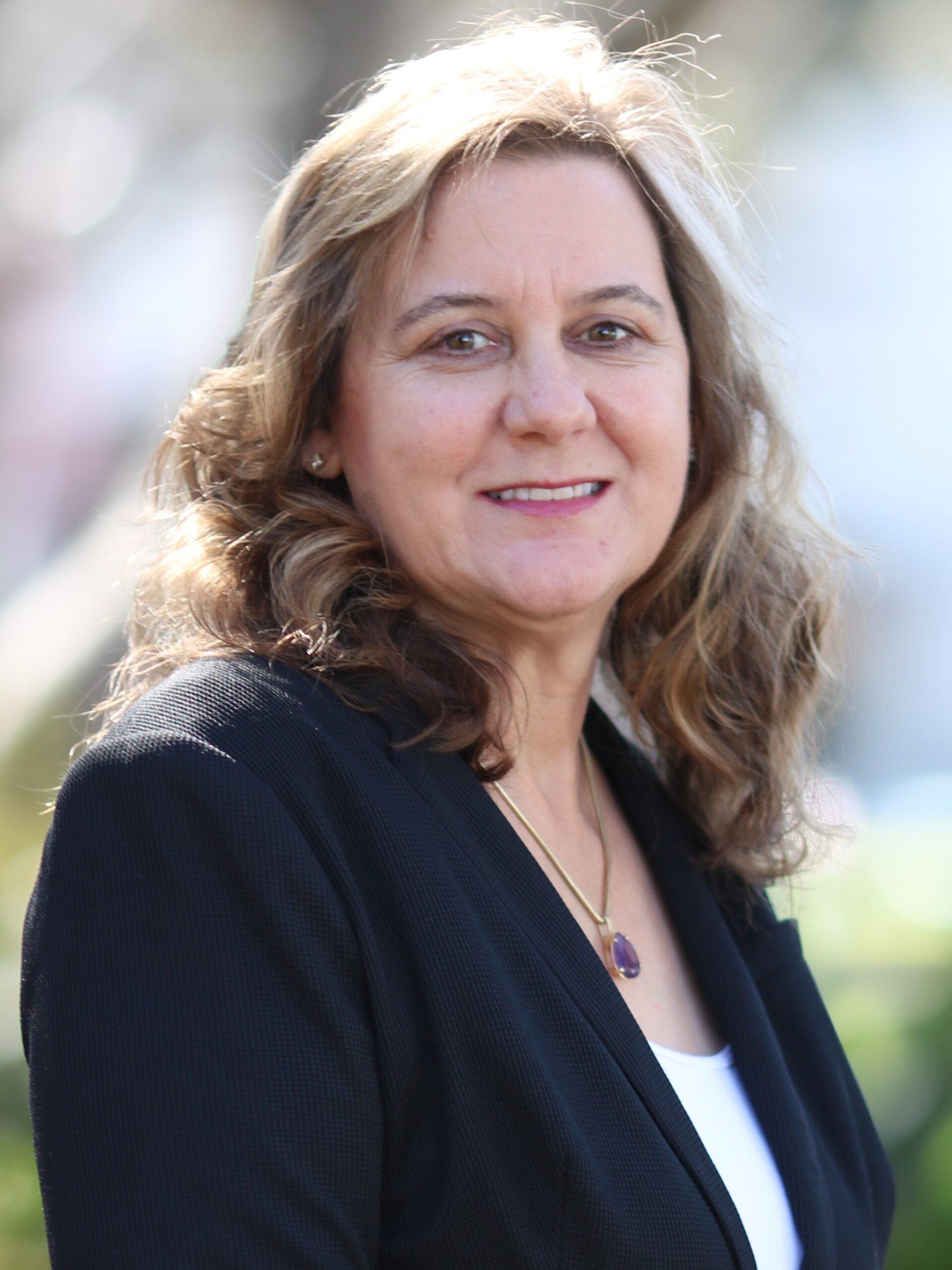
Trina Coffman-Gomez
Age: 61.
- Coffman-Gomez served on the Watsonville City Council from 2012 to 2020.
- She is a real estate broker, mortgage broker and owner of Integrity Lending and Allegiance Realty.
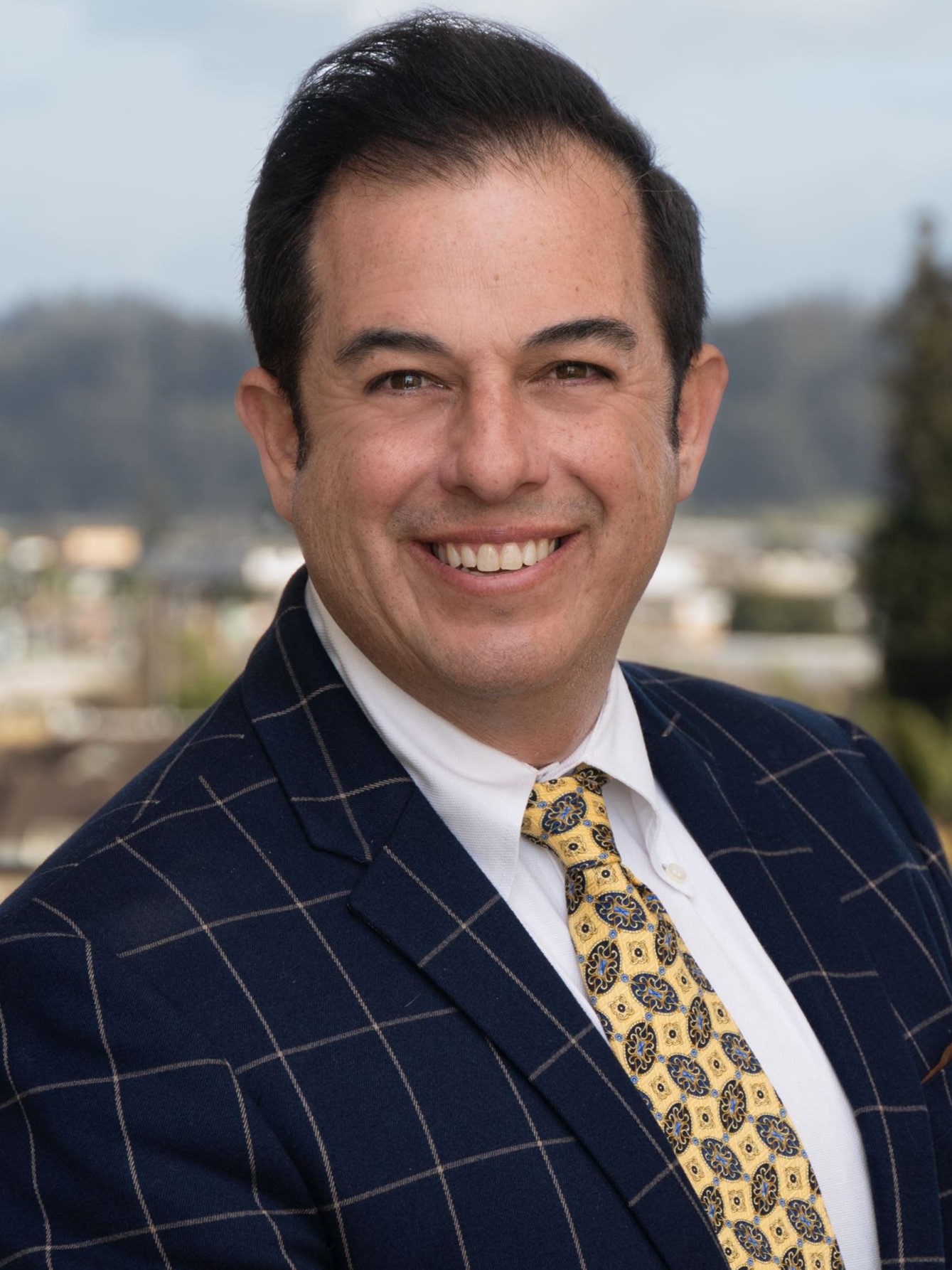
Jimmy Dutra (incumbent)
Age: 49.
- Dutra has been on the Watsonville City Council since 2020
- In a civil court in September, Dutra was found liable for $1.1 million in damages stemming from the sexual assault of a 12-year-old boy in 2005.
| Issue | Trina Coffman-Gomez | Jimmy Dutra |
|---|---|---|
| How should the city council address homelessness? | Be an advocate for more funding. | Continue to offer shelter and focus on mental health resources. |
| How can the city council get more city streets fixed? | Leverage current funding and prioritize areas that are most in need. | Continue discussions about whether each city council member should be able to prioritize streets within their district. |
| Do you support Measure V, remove a requirement that Watsonville commissioners are registered voters? | No. | Yes. |
| How should the city council facilitate the growth of affordable housing in Watsonville? | Focus on opportunities for home ownership rather than below-market-rate rental projects. | Find a way to prioritize current residents in new projects. “The rest of the county needs to pick up the slack as well.” |
| Would you support a law that allows rent control in Watsonville? | “City law that supersedes the state would be a very difficult ballot initiative to support.” | “I would have to do further work on how that would work. But I definitely think there needs to be some sort of ceiling.” |
| Do you support electric rail in Watsonville? | Yes. | Yes. |
| Do you support Measure Q, Santa Cruz County Water and Wildfire Protection Initiative? | Undecided. | Undecided. |
| How should the city council address high rents? | Facilitate homeownership and work with developers to plan and construct new homes for sale. | Continue to work with city staff to find a strategy. |
How should the city council address homelessness?
Trina Coffman-Gomez: Be an advocate for more funding.
Jimmy Dutra: Continue to offer shelter and focus on mental health resources.
How can the city council get more city streets fixed?
Coffman-Gomez: Leverage current funding and prioritize areas that are most in need.
Dutra: Continue discussions about whether each city council member should be able to prioritize streets within their district.
Do you support Measure V, remove a requirement that Watsonville commissioners are registered voters?
Coffman-Gomez: No.
Dutra: Yes.
Would you support a law that allows rent control in Watsonville?
Coffman-Gomez: “City law that supersedes the state would be a very difficult ballot initiative to support.”
Dutra: “I would have to do further work on how that would work. But I definitely think there needs to be some sort of ceiling.”
Do you support electric rail in Watsonville?
Coffman-Gomez: Yes.
Dutra: Yes.
Measure Q, Santa Cruz County Water and Wildfire Protection Initiative
Coffman-Gomez: Undecided.
Dutra: Undecided.
How should the city council address high rents?
Coffman-Gomez: Facilitate homeownership and work with developers to plan and construct new homes for sale.
Dutra: Continue to work with city staff to find a strategy.
How should the city council facilitate the growth of affordable housing in Watsonville?
Coffman-Gomez: Focus on opportunities for home ownership rather than below-market-rate rental projects.
Dutra: Find a way to prioritize current residents in new projects. “The rest of the county needs to pick up the slack as well.”
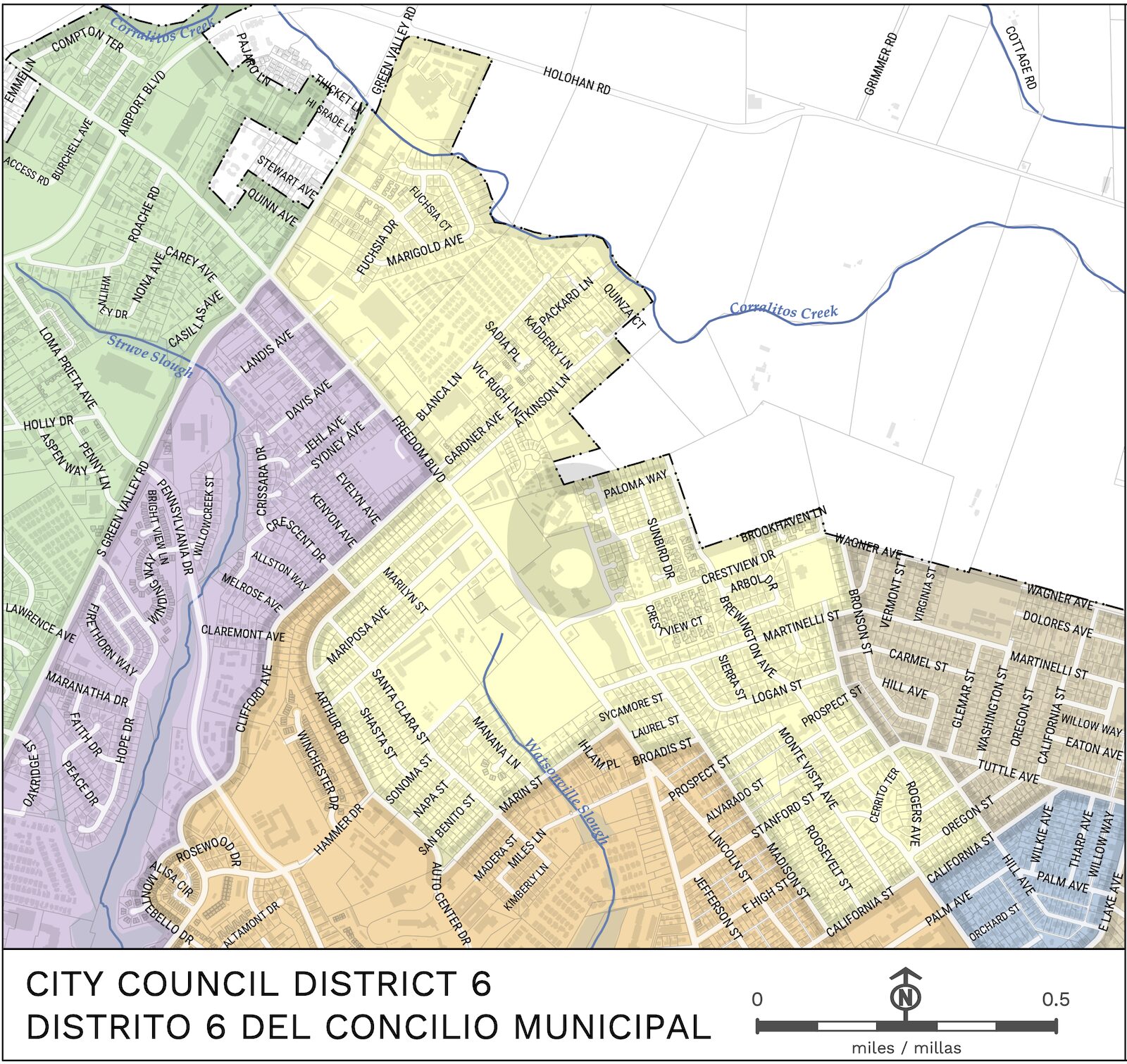
District 6 is in yellow. View a larger map of Watsonville City Council districts. (City of Watsonville)
Santa Cruz Local interviewed and surveyed residents in Watsonville this summer about their priorities for city council candidates. The following questions are based on what we heard from voters.
In District 1, incumbent Watsonville City Councilmember Eduardo Montesino is running unopposed.
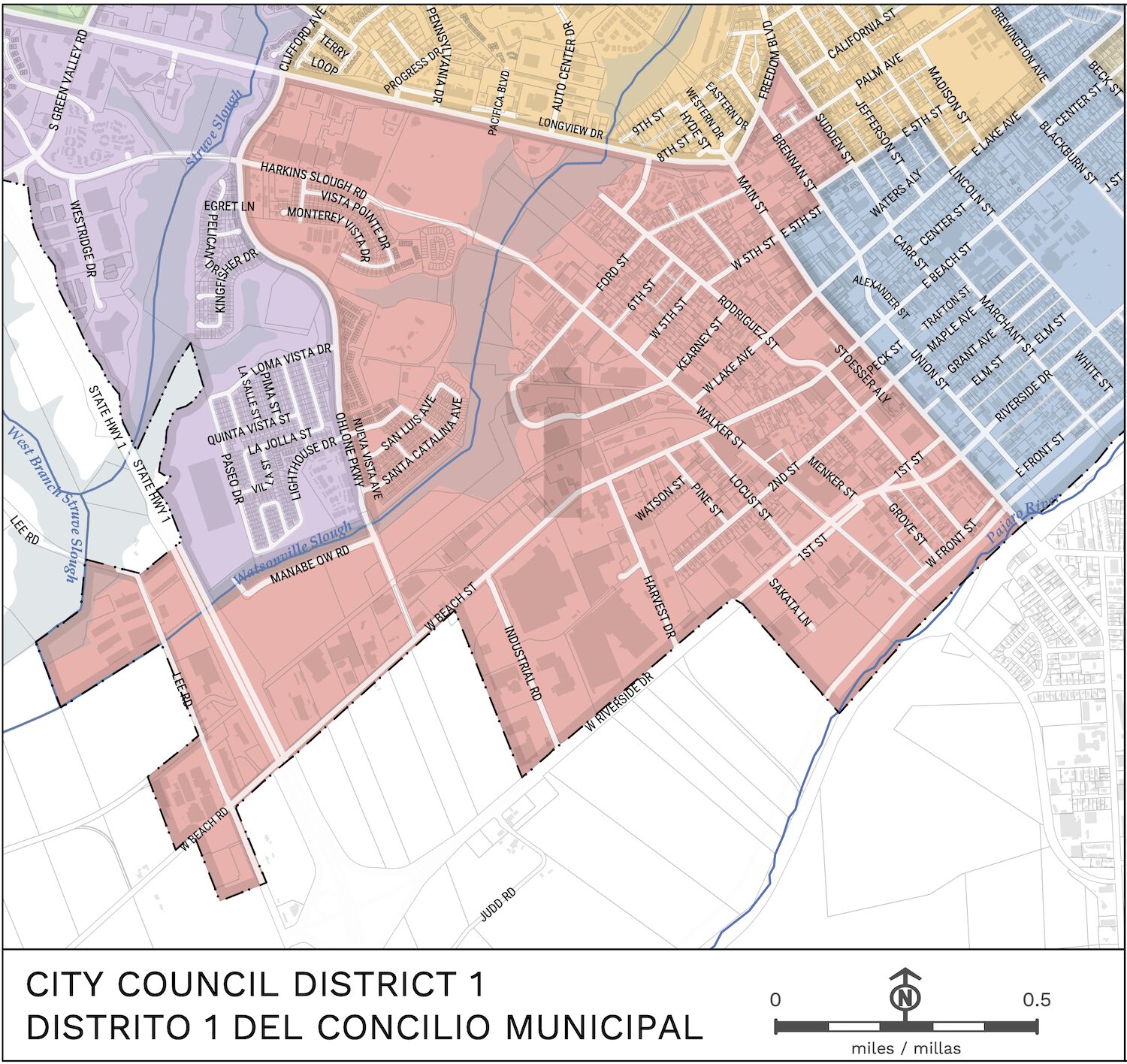
District 1 is in red. View a larger map of Watsonville City Council districts. (City of Watsonville)
In District 2 incumbent Watsonville Mayor Vanessa Quiroz-Carter is running unopposed.
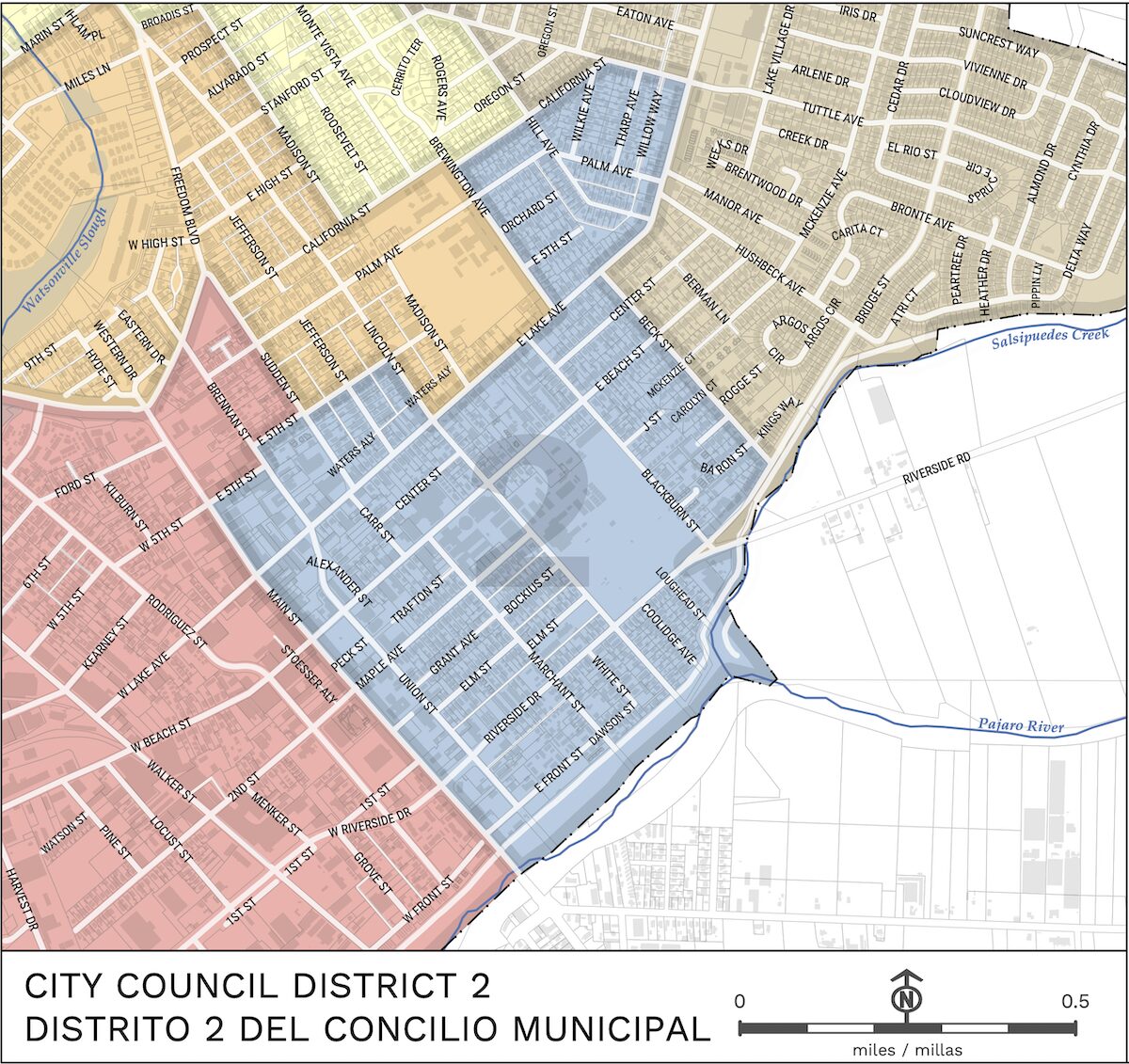
District 6 is in blue. View a larger map of Watsonville City Council districts. (City of Watsonville)
The Watsonville City Council is a seven-member elected body that creates city laws, sets the city’s budget and oversees city functions including Watsonville police, fire and Parks and Community Services. Watsonville City Council members serve four-year terms. The mayor is appointed each December.
The council has the power to:
Qualifications and salaries
Watsonville City Council candidates must be a registered city voter for at least 30 days and live in the district they represent. Other desirable qualifications for candidates include:
- A willingness to work with other council members to craft policies.
- An ability to understand complex budgets.
- Broad interests: The council’s oversight includes the city’s water and wastewater systems, contracts with city employee unions, planning for growth, and public buildings and facilities.
In February the Watsonville City Council raised pay for council members to $1,600 per month, the maximum allowed by state law. The new pay goes into effect when a council member begins a new term. Measure W on Watsonville voters’ ballots Nov. 5, would give the mayor a 25% raise, among other changes to the city charter.
This year, Santa Cruz Local talked to Watsonville residents in a focus group and an online survey. Their most common questions and issues were taken to the candidates.
The top themes raised by Watsonville residents were:
- A need for affordable housing.
- A need for more businesses that cater to young people and families.
- Help with rent.
- Safer streets for walkers and cyclists.
- Better quality jobs and higher wages.



